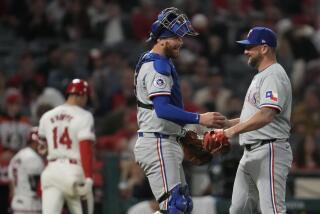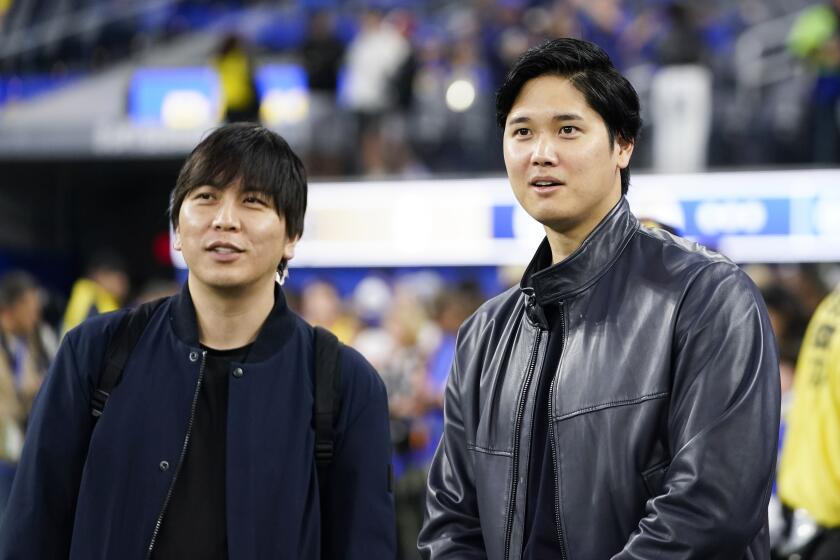Exploring the Glaus Ceiling
TEMPE, Ariz. — The mantra chanted by the Angels is akin to the relentless pounding of those infernal noise sticks.
As the full squad worked out, there was no mistaking the message. The Angels were saying, “You ain’t seen nothing yet.”
Who can blame them?
They carry the confidence and momentum of their World Series title and a season of 110 victories.
The manager reminds them that they are starting at the bottom of the ladder again, but even Mike Scioscia says this is a championship-caliber club that can and should be better than last year’s championship club and will play with that throwback, selfless style.
As Scioscia and the players point out, only Scott Spiezio and Adam Kennedy, among the position players, had career years, and they did it only because they are just beginning to play regularly.
Said center fielder Darin Erstad, “There’s definitely room for improvement.”
So the glow of October warms February, but there are no guarantees.
When is a career year a career year? Who can say one will be followed by another?
Noted Troy Glaus, “Nobody can tell you what a person’s potential is, or what their best season is, until their career is over and you’re able to look back on it.”
Perhaps, but nobody among the Angels has the ceiling Glaus does. Nobody is more capable of carrying his team, no matter how the career years of others evolve, and nobody else can hit 30 home runs and drive in 111 runs and have it be considered an off year.
Of course, that “off year” took on a new perspective when the 26-year-old third baseman ate up the playoffs and became the most valuable player in the World Series, underscoring his talent and potential on the national stage and leaving even the awed Angels to reevaluate the ceiling.
As Erstad put it, “There’s no limit. He hasn’t come close to tapping his potential yet.”
Scioscia agreed.
“It’s scary when you think about how much more he has in him,” the manager said. “I’m not suggesting that at some point he’ll go from the 47 homers of [2000] to 60, but as his consistency continues to improve, as he gets more experience, he’s going to put up some real big numbers.”
Which is not to say he hasn’t already, even burdened with the expectations that accompanied him out of UCLA as the Angels’ No. 1 draft choice in 1998.
Some in the organization have mumbled about his stubbornness, a failure to use his power to the opposite field, a lack of selectivity at the plate.
However, Glaus joined the Angels in his first pro season, was force-fed at the major league level, and has still managed to lead the majors with those 47 homers in 2000, hit 41 the next year, slug 118 to lead all major league third basemen since 2000 and produce a career-high 111 RBIs in that “off year” last year before his devastating clutch performance in the 16 postseason games.
Glaus hit a total of seven home runs -- exceeded only by Barry Bonds’ record eight -- and drove in 13 runs while batting .313 in the division series victory over the New York Yankees, .316 in the league championship victory over the Minnesota Twins and .385 in the seven-game World Series victory over Bonds and the San Francisco Giants.
“He was committed to using the entire field, which is the key for all hitters,” said Erstad. “He was locked in.”
Did Glaus carry the key over the off-season?
“I wanted to create a better rhythm and made some adjustments late in the season that paid off in the playoffs,” he said. “In a lot of ways, that was a long time ago, but I still feel like I’m starting now from a better place than I ever have. I feel like I’ve continued to make good strides, improving in areas I want to improve in. I feel like I can be more consistent, day in and day out.”
The numbers can be deceiving. Although Glaus hit only .250 for the second consecutive season, and although his 30 homers were 11 fewer than in 2001, he picked up the situational beat that the Angels preach and practice, batting .293 with runners in scoring position, .316 when there were two outs in that situation and .424 with a runner on third and fewer than two outs.
“I have a better understanding of situations and what to do with certain pitches,” he said. “I’m doing a better job of scoring the, quote, easy run from third base, hitting a ground ball or a fly ball instead of popping out or striking out trying to do too much, and I don’t agree with people who say I had a down year last year. I drove in more runs than I ever have, which is my job, and I scored a lot of runs [99]. As I’ve said many times, home runs don’t matter to me. I’d rather have 30 with 130 RBIs than 40 with 101 or 102.”
Besides, any year ending with World Series and MVP titles can’t be construed as a down year, other than in the context of coming down from the October high to spend a quiet off-season with his lady friend, Ann Horrell, who is trying to break into the national equestrian ranks in the three-day program that combines dressage, jumping and cross-country. Glaus and Horrell moved recently from Norco to Corona, where they are building a barn for their three horses, two of which Horrell uses in competition.
Does Glaus ride?
“I wouldn’t call it riding,” he said. “I climb up, but only to walk on the trail. I mean, I get scared even watching Ann compete.
“It’s not like being in the batter’s box, where I feel like I have some control.”
Given his control in postseason play, the Angels may be right. Perhaps we ain’t seen nothing yet.
More to Read
Go beyond the scoreboard
Get the latest on L.A.'s teams in the daily Sports Report newsletter.
You may occasionally receive promotional content from the Los Angeles Times.






